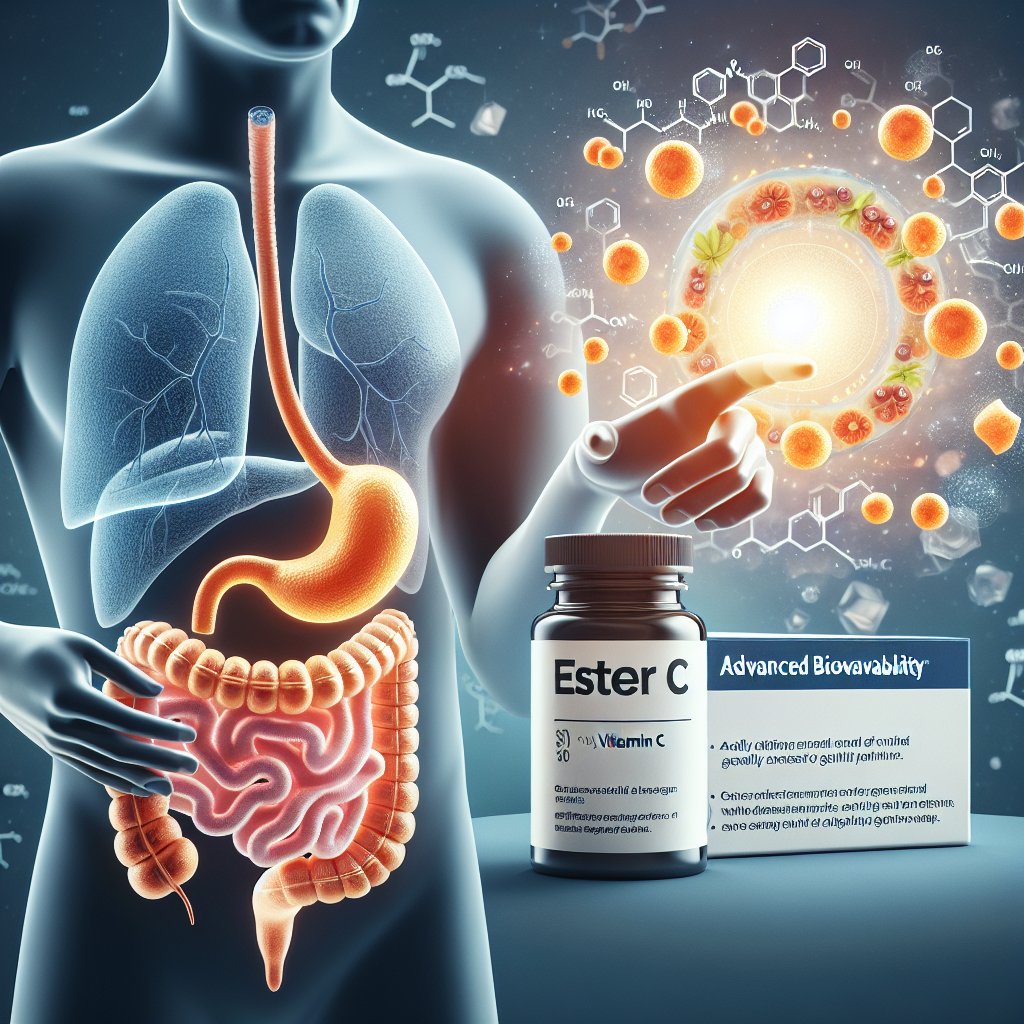Vitamin C vs Ester C: Which Is the Ultimate Game-Changer for Your Health?
Vitamin C vs Ester C: Which Is the Ultimate Game-Changer for Your Health?
Hey there, keto warriors! Today, we’re diving into the world of vitamins and antioxidants, exploring two superstars in particular: vitamin C and Ester C. These powerful nutrients are vital for our overall health and well-being, and in the realm of the ketogenic lifestyle, they play an especially crucial role.
Importance of Vitamin C and Ester C in Daily Health and Wellness
Let’s start with good old-fashioned vitamin C, also known as ascorbic acid. We all know it as the go-to remedy for colds and flu, but its benefits extend far beyond just fighting off sniffles. Vitamin C is a potent antioxidant, meaning it helps protect our cells from damage caused by free radicals. This, in turn, supports a healthy immune system and promotes radiant skin – a win-win, right?
Ester C, on the other hand, is a unique form of vitamin C that’s gentler on the stomach and stays in the white blood cells longer than regular vitamin C, amplifying its immune-boosting effects. Studies have shown that Ester C has higher bioavailability, meaning that it’s easier for the body to absorb and utilize compared to traditional ascorbic acid.
So, why does this matter for us keto enthusiasts? Well, our bodies thrive on a nutrient-dense, low-inflammatory diet, and ensuring we get the most from our vitamin intake is key. Whether you’re aiming for that radiant keto glow or fortifying your immune system for optimal health, understanding the difference between vitamin C and Ester C is the ultimate game-changer. So, buckle up, because we’re about to uncover the secret to unlocking their full potential in your daily wellness routine.

What is Vitamin C?
Vitamin C is a powerhouse nutrient that is essential for overall health and well-being. Also known as ascorbic acid, it’s a water-soluble vitamin that plays a crucial role in various bodily functions. One of its primary functions is acting as an antioxidant, which helps protect cells from damage caused by free radicals. Additionally, vitamin C is vital for the growth, development, and repair of all body tissues.
The Benefits of Vitamin C
Let’s talk about the incredible benefits of vitamin C. First and foremost, it’s renowned for its immune-boosting properties. Scientific research has shown that this vitamin supports the immune system by stimulating the production and function of white blood cells, which help protect the body against infections and illnesses. In fact, a deficiency in vitamin C can lead to a weakened immune response, making it easier for the body to fall prey to various diseases.
Moreover, as an antioxidant, vitamin C helps combat oxidative stress in the body. It neutralizes free radicals, which are unstable molecules that can damage healthy cells and lead to inflammation and disease. By doing so, it’s also known to promote skin health, improve iron absorption, and contribute to the maintenance of healthy bones, cartilage, and teeth.
In essence, incorporating vitamin C into your diet or through supplementation can lead to a myriad of benefits, such as improved immune function, enhanced skin health, and overall disease prevention. It’s truly a game-changer for your health!
What is Ester C?
Let’s start by diving into the world of vitamin C and exploring an exciting form known as Ester C. So, what exactly is Ester C, and why is it gaining so much attention?
Ester C is a unique form of vitamin C that is formulated to provide enhanced absorption and is gentler on the stomach compared to traditional vitamin C supplements. It is created through a proprietary process that combines ascorbic acid with calcium to form a non-acidic, pH-neutral calcium ascorbate. This unique composition is what sets Ester C apart from standard vitamin C supplements.
Research has shown that Ester C is well-retained in the body’s immune cells, offering advanced immune support. Additionally, its non-acidic nature makes it a suitable option for individuals with sensitive stomachs who may experience discomfort when taking regular vitamin C.
One of the key benefits of Ester C is its enhanced absorption. Studies have demonstrated that Ester C is up to 4 times more readily absorbed by the body than traditional vitamin C, leading to higher cellular levels of vitamin C. This means that you can experience the benefits of vitamin C more effectively with Ester C compared to standard forms of the vitamin.
Moreover, Ester C stays in the white blood cells for up to 24 hours, which is longer than regular vitamin C, providing a longer-lasting support for the immune system.
In summary, Ester C is a game-changer in the world of vitamin C supplements. Its unique formulation offers enhanced absorption, longer retention in the body, and a gentle-on-the-stomach experience, making it a top choice for individuals seeking optimal immune support and overall wellness.

Differences between Vitamin C and Ester C
When it comes to boosting your health, both vitamin C and Ester C are popular choices. But what sets them apart? Let’s delve into the detailed comparison of their chemical structure, absorption rate, and potential side effects to help you make an informed decision.
Chemical Structure
Vitamin C, also known as ascorbic acid, is a water-soluble vitamin found in many fruits and vegetables. On the other hand, Ester C is a patented form of vitamin C that contains calcium ascorbate and metabolites. The primary difference lies in the form and structure of the compounds. Ester C is formulated to be less acidic and gentler on the stomach, making it a suitable option for those with sensitive stomachs.
Absorption Rate
When it comes to absorption, Ester C has been found to have a higher bioavailability than regular vitamin C. Research published in the journal Alternative Medicine Review suggests that Ester C is able to be absorbed into the bloodstream faster and in higher amounts compared to traditional vitamin C supplements. This means that Ester C may be more effective at delivering the benefits of vitamin C to the body.
Potential Side Effects
One of the potential drawbacks of high doses of regular vitamin C is its tendency to cause gastrointestinal discomfort, including gas, bloating, and diarrhea, due to its acidic nature. This is where Ester C shines. Its calcium ascorbate composition makes it a non-acidic form of vitamin C, which may mitigate the likelihood of stomach discomfort associated with traditional vitamin C supplements.
Additionally, some studies have suggested that excessive intake of regular vitamin C could lead to an increased risk of kidney stone formation in individuals susceptible to this condition due to its oxalate content. Ester C, with its calcium ascorbate form, provides calcium, which can bind to oxalate in the intestines and potentially reduce the risk of kidney stone formation associated with excessive vitamin C intake. However, further research is needed to confirm this potential benefit.
Ultimately, both vitamin C and Ester C offer their own set of advantages. While traditional vitamin C is widely available and has been extensively researched, Ester C offers a gentler, non-acidic form with improved bioavailability. Consider your individual health needs and sensitivities when choosing between the two, and consult with a healthcare professional for personalized advice.
In the next section, we’ll explore the specific health benefits of both vitamin C and Ester C, and how they can contribute to your overall well-being. Stay tuned!
Explore the various health benefits of traditional vitamin C supplementation
When it comes to supporting your overall health and well-being, vitamin C is often hailed as a superstar nutrient. From boosting the immune system to promoting radiant skin, the benefits of traditional vitamin C supplementation are well-established.
Immune System Support
Vitamin C is renowned for its immune-boosting properties. A study published in Nutrients journal highlighted that vitamin C plays a crucial role in enhancing the function of various immune cells, including the natural killer cells and lymphocytes, which are essential for defending the body against infections and illnesses1.
Antioxidant Protection
Traditional vitamin C acts as a powerful antioxidant, helping to combat the harmful effects of free radicals in the body. Research in the International Journal of Molecular Sciences reveals that vitamin C helps neutralize oxidative stress and reduces the risk of chronic diseases associated with oxidative damage2.
Collagen Production
Vitamin C is vital for the synthesis of collagen, a protein that plays a pivotal role in maintaining the strength and elasticity of skin, tendons, and connective tissue. According to a study in Nutrients journal, vitamin C supplementation is linked to improved skin texture, reduced wrinkling, and overall skin health3.
Heart Health
Several studies have established a positive relationship between vitamin C intake and cardiovascular health. Research published in the Journal of the American Heart Association suggests that regular consumption of vitamin C is associated with a reduced risk of heart disease and stroke4.
Improved Iron Absorption
It’s fascinating to note that traditional vitamin C can enhance the absorption of non-heme iron from plant-based sources. A study in The American Journal of Clinical Nutrition found that consuming vitamin C-rich foods or supplements alongside iron-rich meals can significantly improve iron absorption, thus aiding in the prevention of iron deficiency anemia5.
Traditional vitamin C supplementation offers a wealth of health benefits that can positively impact various aspects of your well-being. From strengthening your immune system to promoting skin radiance and supporting heart health, incorporating vitamin C into your daily routine is a simple yet powerful way to enhance your overall health.
1 Source
2 Source
3 Source
4 Source
5 Source

Benefits of Ester C
When it comes to boosting your health, you’ve probably heard about the incredible benefits of vitamin C. But did you know that not all vitamin C supplements are created equal? Enter Ester C – the ultimate game-changer for your health. Let’s dive into the advantages of Ester C over standard vitamin C and why it’s gaining popularity among health enthusiasts.
Bioavailability
One of the key advantages of Ester C is its superior bioavailability compared to standard vitamin C. Bioavailability refers to the amount of a substance that enters the bloodstream when introduced into the body. Ester C contains calcium ascorbate and metabolites, which make it easier for the body to absorb and utilize vitamin C. Research has shown that Ester C is absorbed into the bloodstream faster and retained for a longer period compared to standard vitamin C, making it an efficient choice for reaping the benefits of this essential nutrient.
Reduced Stomach Irritation
Standard vitamin C, such as ascorbic acid, can sometimes cause stomach irritation and digestive discomfort, especially when taken in high doses. On the other hand, Ester C is non-acidic and gentle on the stomach, making it a perfect option for individuals with sensitive stomachs or those prone to acid reflux. This reduced potential for stomach irritation means that you can enjoy the benefits of vitamin C without the unpleasant side effects, making it a preferred choice for daily supplementation.
So, if you’ve been hesitant about taking vitamin C due to stomach issues, Ester C could be the solution you’ve been searching for.
With its enhanced bioavailability and gentle effect on the stomach, Ester C offers a compelling advantage over standard vitamin C. Whether you’re looking to support your immune system, promote healthy aging, or enhance collagen production for glowing skin, Ester C provides a convenient and effective way to incorporate this vital nutrient into your daily routine.
Unlocking the Power of Vitamin C and Ester C
When it comes to supercharging your health, the benefits of vitamin C and Ester C cannot be overstated. Both play crucial roles in supporting our overall well-being, but what exactly sets them apart? Let’s dive into the scientific studies and research to uncover the effectiveness and benefits of these two powerhouse nutrients.
The Effectiveness of Vitamin C
For decades, vitamin C has been hailed as a potent antioxidant that supports the immune system and promotes radiant skin. A comprehensive study published in Nutrients Journal revealed that regular intake of vitamin C has been linked to reduced duration and severity of upper respiratory tract infections, making it a go-to nutrient for bolstering the body’s defenses.
Moreover, a review published in the International Journal of Molecular Sciences highlighted vitamin C’s pivotal role in collagen synthesis, which is essential for maintaining skin elasticity and resilience. The evidence is clear: vitamin C is a game-changer for overall health and well-being.
The Benefits of Ester C
Ester C, a unique form of vitamin C, has been making waves in the health community due to its enhanced bioavailability and gentler effect on the stomach. A study in the journal Alternative Medicine Review suggested that Ester C exhibits a quicker absorption rate and stays in the body for a longer duration compared to regular vitamin C, resulting in sustained antioxidant activity.
Furthermore, the research conducted by Inter-Research Science Center found that Ester C surpasses traditional vitamin C in promoting collagen formation and protecting against oxidative stress, making it a top contender for those seeking optimal skin health and overall wellness.
In summary, while both vitamin C and Ester C offer remarkable health benefits, the unique properties of Ester C, such as enhanced absorption and superior antioxidant activity, position it as the ultimate game-changer for your health.

Usage and Dosage
When it comes to reaping the benefits of vitamin C and Ester C, it’s essential to understand the appropriate usage and dosage for different age groups and health conditions.
Vitamin C Dosage
For adults, the recommended dietary allowance (RDA) for vitamin C is 75mg for women and 90mg for men. For pregnant women, the RDA is 85mg, and for breastfeeding women, it’s 120mg. However, during periods of illness or stress, higher doses of vitamin C may be beneficial.
For children, the RDA varies by age. For example, children aged 1-3 years require 15mg, while those aged 14-18 years need 65-75mg of vitamin C daily.
Ester C Dosage
Ester C is a unique form of vitamin C that boasts enhanced absorption and retention in the body. The recommended dosage of Ester C is typically lower than that of traditional vitamin C. Adults often start with a dosage of 500-1000mg daily, while children may take 250-500mg per day, depending on their age and specific health needs.
When it comes to health conditions, individuals with certain medical issues such as iron overload disorders, kidney problems, or a history of kidney stones should consult a healthcare professional before supplementing with vitamin C. Ester C, with its gentle and non-acidic formulation, may be a more suitable option for these individuals.
Always consult with a healthcare provider or nutritionist to determine the most appropriate dosage of vitamin C or Ester C based on individual health status and specific health goals.
Potential Side Effects of Vitamin C and Ester C
When it comes to the benefits of vitamin C and Ester C, it’s essential to consider any potential side effects or interactions, especially if you’re taking medications or have certain health conditions.
Vitamin C Side Effects
Vitamin C is generally considered safe for most people when taken orally in appropriate doses. However, excessive intake of vitamin C supplements may lead to certain adverse effects. Some individuals may experience digestive issues such as diarrhea, nausea, and stomach cramps.
Ester C Side Effects
Ester C, a form of vitamin C that is less acidic and touted to be more gentle on the stomach, is widely regarded as safe for consumption. However, some individuals may still experience mild side effects such as headaches, dizziness, or digestive discomfort, especially if taken in high doses.
Interactions with Medications
Both vitamin C and Ester C can interact with specific medications. For instance, large doses of vitamin C may interfere with the absorption and effectiveness of certain medications like blood thinners, chemotherapy drugs, and certain antibiotics. It’s important to consult with a healthcare professional before combining high-dose vitamin C supplements with any prescribed medications.
Similarly, Ester C may have interactions with medications such as aluminum, protease inhibitors, and certain medications changed and broken down by the liver. It’s crucial to discuss with your healthcare provider if you’re considering taking Ester C supplements alongside any prescription medications.
Health Conditions
Individuals with certain health conditions should also approach vitamin C and Ester C supplementation with caution. Those with a history of oxalate kidney stones should not take high-dose vitamin C supplements, as they can increase the risk of stone formation. Additionally, individuals with conditions affecting iron metabolism, such as hemochromatosis, should also consult a healthcare professional before taking vitamin C supplements due to its potential to enhance iron absorption.
Similarly, individuals with underlying health conditions such as kidney disease, liver disease, and specific genetic disorders should seek medical advice before initiating Ester C supplementation.
In conclusion, while vitamin C and Ester C offer a multitude of health benefits, it’s crucial to be aware of the potential side effects and interactions, especially when combining them with medications or if you have underlying health conditions. Consulting a healthcare professional before starting any new supplement regimen is always a wise decision.
Summarize the Key Points
When it comes to vitamin C and Ester C, there are a few key differences that are important to understand. Vitamin C, also known as ascorbic acid, is a water-soluble vitamin that is essential for the growth, development, and repair of all body tissues. It’s also involved in many body functions, including the formation of collagen, absorption of iron, and maintenance of cartilage, bones, and teeth.
Ester C, on the other hand, is a patented form of vitamin C that is considered to be more bioavailable and easier on the stomach compared to regular ascorbic acid. Ester C contains calcium ascorbate and metabolites, which are natural chemical substances found in the body that help enhance the absorption of vitamin C.
Research indicates that while both vitamin C and Ester C offer similar health benefits, Ester C may have the edge in terms of absorption and retention in the body due to its unique composition.
Recommendation on Suitable Forms
For individuals who experience stomach discomfort or digestive issues when taking regular vitamin C supplements, Ester C may be a more suitable alternative. Its gentle on the stomach and offers a buffered form of vitamin C, making it easier for sensitive individuals to tolerate without causing gastrointestinal disturbances such as bloating or cramping.
For those seeking a supplement that is readily absorbed and retained in the body, Ester C may also be the preferred choice. Its bioavailability and ability to stay in the system for a longer duration make it a convenient option for individuals with busy lifestyles or those looking to maintain consistently high vitamin C levels.
However, for individuals who are not experiencing any digestive discomfort and are looking for a cost-effective option, regular vitamin C supplements may still be a suitable choice. There is a wide variety of vitamin C products available in the market, ranging from chewable tablets to powders, which provide flexibility in choosing the most convenient form based on individual preferences.
Ultimately, the decision between vitamin C and Ester C comes down to personal tolerance, budget, and lifestyle. Consulting with a healthcare professional can also provide valuable guidance in selecting the most suitable form of vitamin C based on individual health needs and goals.
In conclusion, both vitamin C and Ester C offer valuable health benefits, and the choice between the two ultimately depends on individual preferences, tolerances, and lifestyle factors. With the wide array of options available, individuals can find a suitable vitamin C supplement that seamlessly integrates into their daily health regimen.


